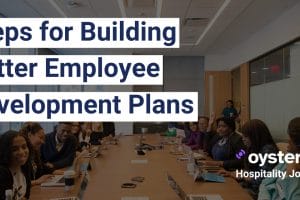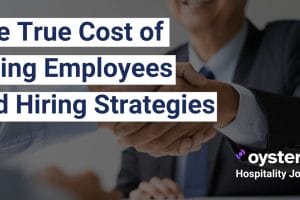As in any other organization, it’s important to understand the reporting structure in a restaurant to establish a clear hierarchy. A reporting structure outlines who reports to whom, which avoids confusion and ensures accountability.
The Director of Restaurant Operations, for example, supervises multiple Managers or department heads within a restaurant company. They’re at the top of the organizational hierarchy, just below the executive level, and are responsible for running an efficient and profitable restaurant operation.
For this article, we’ll identify the key personnel who report to the Director of Restaurant Operations, as well as their main functions in a dining establishment.
What Is the Director of Restaurant Operations In Charge Of?
The Director of Restaurant Operations is the strategic leader responsible for an establishment or company’s overall performance and operational efficiency. To do this, they create and implement strategies that will optimize all aspects of the restaurant’s operations to maximize revenue and profitability.
They also analyze market trends, consumer preferences and competitor activities to uncover opportunities for growth and expansion. Beyond operational management, they work closely with the Chief Operations Officer (COO) and the Chief Executive Officer (CEO) to shape the company’s direction and achieve its long-term goals.
Key Responsibilities of the Director of Operations
The Director of Operations plays a pivotal role in ensuring the seamless functioning of an organization. Key responsibilities include:
- Overseeing Daily Operations: Ensuring that all departments operate efficiently and align with the company’s strategic goals.
- Strategic Planning: Collaborating with senior management to develop and implement plans that enhance operational effectiveness.
- Resource Management: Allocating resources judiciously to maximize productivity and minimize costs.
- Performance Monitoring: Setting performance targets and regularly assessing departmental outputs to ensure objectives are met.
- Process Improvement: Identifying areas for improvement and implementing initiatives to enhance operational workflows.
By delineating these responsibilities, organizations can better understand the integral role the Director of Operations plays in driving success.
Essential Skills for a Director of Operations
Excelling as a Director of Operations requires a diverse skill set, including:
- Leadership: Inspiring and guiding teams to achieve their objectives.
- Analytical Thinking: Assessing complex data to inform decisions and optimize processes.
- Communication: Articulating goals, strategies, and updates clearly to stakeholders at all levels.
- Problem-Solving: Addressing challenges quickly and effectively to minimize disruptions.
- Project Management: Ensuring projects are delivered on time, within scope, and aligned with business objectives.
These core competencies enable Directors of Operations to drive efficiency, maintain cohesion across departments, and deliver measurable results.
Common Challenges Faced by Directors of Operations
While the role of the Director of Operations is crucial, it comes with its set of challenges:
- Balancing Strategic and Operational Priorities: Juggling long-term strategic initiatives with immediate operational demands.
- Change Management: Effectively leading the organization through transitions and ensuring team buy-in.
- Resource Constraints: Managing limited resources while striving to meet organizational goals.
- Maintaining Consistent Communication: Ensuring clear and consistent communication across all departments to align efforts.
- Adapting to Market Dynamics: Staying agile and responsive to changing market conditions and external factors.
Recognizing these challenges allows organizations to provide the necessary support to their Directors of Operations, facilitating smoother operations and strategic alignment.
How the Director of Operations Impacts Organizational Success
The Director of Operations serves as the backbone of organizational efficiency and productivity. Here’s how they drive success:
- Operational Efficiency: By streamlining processes, they reduce redundancies and ensure resources are utilized optimally.
- Team Alignment: They bridge gaps between departments, fostering collaboration and ensuring everyone works toward shared goals.
- Risk Mitigation: With a comprehensive view of the organization, they identify potential risks and develop strategies to address them proactively.
- Scalability: They implement systems and processes that enable the organization to scale operations seamlessly as it grows.
- Revenue Growth: Operational improvements and resource optimization often translate into cost savings and increased profitability.
With their unique ability to translate strategy into actionable steps, the Director of Operations plays a critical role in the company’s long-term success.
10 Employees That Report to the Director of Restaurant Operations
The Director of Restaurant Operations is the head of the management team for the entire restaurant company. This means they oversee and manage a group of individuals who are responsible for leading specific departments or divisions within the company.
Each department manager or head reports about the restaurant’s status and performance based on the agreed goals and key performance indicators (KPIs). They also provide feedback and ask for guidance and direction regarding challenges they may be facing.
Meanwhile, it’s the Director’s job to assess these reports so they can identify trends, pinpoint areas of strength and weakness, and measure the effectiveness of the restaurant’s current strategies. This allows the Director to make informed decisions about refining the existing business plans or developing entirely new initiatives.
Now, let’s identify the employees that typically report to the Director of Operations in a restaurant, along with their respective duties and responsibilities:
1. Restaurant Manager
The Restaurant Manager provides the Director with updates on the restaurant’s day-to-day operations and performance. They may also report on sales, customer feedback, staff management and ask guidance about operational issues they’re facing.
2. Restaurant General Manager
The Restaurant General Manager (RGM) is also responsible for daily operations, but they have higher-level functions. Compared to the Restaurant Manager, who’s in charge of a particular restaurant branch, the RGM may oversee several locations. Their duties include payroll management, annual budget management and human resources administration.
3. Kitchen Manager
Kitchen Managers supervise back-of-house or kitchen operations. They’re responsible for efficient food preparation, quality control and adherence to health and safety standards.
They’re also known to have several alternative titles, such as Culinary Managers, Kitchen Supervisors, Kitchen Directors and Culinary Leads.
Check out this short video to see how back-of-house teams work behind the scenes:
4. Executive Chef
The Executive Chef plans and develops the restaurant’s menu. They manage the entire kitchen staff (including Line Cooks, Prep Cooks and Sous Chefs) and oversee every food preparation.
While Executive Chefs play a more managerial role, they’re always confused with Head Chefs. This is because smaller establishments usually employ a Head Chef, who combines the responsibilities of both positions.
5. HR Manager
The HR Manager is not a restaurant-specific role, but they perform a wide range of tasks. Their job is primarily recruiting, interviewing and hiring new restaurant staff.
But beyond that, they’re also responsible for developing the company culture, improving employee relations, as well as handling disputes and disciplinary procedures.
The Director of Restaurant Operations relies on the HR Manager to ensure that the restaurant is adequately staffed, employees are well-trained, and the workplace environment supports its operational goals.
6. Finance Manager
In larger restaurant groups, the Finance Manager oversees the company’s financial health.
As such, their job includes managing budgets and tracking revenue and expenses of each store. They work with the Director of Restaurant Operations to develop and implement strategies to ensure financial stability and growth.
7. Training Manager
A Training Manager doesn’t just onboard and train for new hires. They’re also responsible for identifying and assessing training needs for the restaurant staff.
As the Director of Restaurant Operations sets the company’s training goals and standards, the Training Manager is expected to develop the programs to ensure staff competency and adherence to these standards.
8. Marketing Manager
This role may report to the Director of Restaurant Operations or to the Restaurant General Manager, depending on the company’s structure.
The Marketing Manager is responsible for developing a restaurant’s marketing strategy across promotional channels, including social media, digital media and traditional advertising platforms.
In some cases, they are also in charge of managing events such as the opening of a new restaurant location or the launch of a new menu item.
9. IT Manager
Yes, a restaurant can have an IT Manager. The Director of Restaurant Operations relies on the IT Manager to ensure seamless technology operations, including point-of-sale (POS) systems, restaurant management software, computer networks, the website and protecting customer data.
It’s the IT Manager’s role to provide technical support and solutions to enhance restaurant efficiency and guest experience under the Director’s guidance.
10. Quality Assurance Manager
It’s the Quality Assurance Manager’s responsibility to guarantee the highest standards of food quality and safety to achieve customer satisfaction.
Their tasks include implementing quality control procedures, such as developing and implementing sanitation programs, and ensuring quality and regulatory compliance of suppliers. They also conduct regular inspections across all restaurant locations to ensure compliance with food safety regulations.
In addition, the Director of Operations often oversees:
- Project Managers: Ensuring that projects align with operational goals and are completed on time and within budget.
- Operations Analysts: Monitoring performance metrics and providing insights to inform decision-making.
- Supply Chain Managers: Overseeing the procurement and logistics processes to ensure efficient supply chain operations.
- Quality Assurance Teams: Ensuring that the organization’s products or services meet established quality standards.
By clearly defining these reporting lines, organizations can foster a structured environment where roles are well-understood, leading to enhanced efficiency and accountability.
Who Does the Director of Restaurant Operations Report To?
After aligning with the different Managers, the Director of Restaurant Operations will then report to the company’s executives.
These include the COO (or the Vice President of Operations) and the CEO.
Depending on the organization’s size and structure, the Director of Restaurant Operations may also be asked to report to the board of directors.
The Director of Restaurant Operations is accountable to the executive management for the company’s overall operational performance and profitability.
However, when it comes to smaller, independent establishments, they would usually report straight to the restaurant owner.
What Job Comes after Director of Operations?
In terms of career progression, the Director of Restaurant Operations role often serves as a stepping stone to the COO role.
As a Director, you hone the skills to oversee complex business operations, demonstrate leadership and strategic thinking and drive business growth.
The COO also holds these responsibilities, but with a much broader scope. They make high-level decisions that impact all departments (not just within the restaurants).
Factors Affecting the Reporting Structure of a Restaurant
Of course, there’s no one-size-fits-all organizational chart for all restaurants or restaurant companies. That’s why several factors affect the reporting structure, including:
- The size of the restaurant group
- The restaurant brand’s concept and cuisine
- Number of locations across a state or city
- The geographic locations across the country or the world
- Complexity of operations and layers of management
- Ownership and management style
How Do You Become a Director of Restaurant Operations?
The Director of Restaurant Operations carries a big responsibility in making the establishment or company successful. Strong leadership, financial skills and the ability to manage multiple teams and locations are some of the key qualities for this role.
If you’re interested in pursuing a Director of Restaurant Operations career, you’ll need to gain extensive experience within the hospitality industry, specifically in restaurant operations.
You’ll also need a strong educational foundation, like completing a bachelor’s degree in hospitality management, business administration or any related field. This academic background will give you a solid understanding of business principles, financial management, marketing and human resources.
While not always mandatory, certifications can also enhance your qualifications. Your options include:
Gaining certifications can make you an attractive candidate for the role as they show your commitment to professional development and validate your expertise in restaurant operations.
Who Reports to Director of Operations FAQs
Balancing strategy with daily demands. They’re planning for growth, analyzing trends, and improving systems while still solving everyday issues like staffing or operational hiccups. It’s a constant juggling act!
They’re the backbone. By streamlining processes, aligning departments, and spotting opportunities to improve, they drive efficiency, cut costs, and boost revenue. Everything runs better when they’re on their game.
It’s all about accountability. Knowing who reports to whom ensures everyone’s on the same page, decisions get made faster, and no task falls through the cracks. Clear structure = smooth operations.
Leadership and adaptability. They inspire teams, solve problems quickly, and communicate clearly. Plus, they use data and trends to make smarter decisions and keep the business thriving.
Get hands-on experience in restaurant management, study hospitality or business, and sharpen leadership skills. Certifications like CROM can also help you stand out. It’s all about building the right mix of experience and expertise.

Written by Mitko Terziev
With over eight years of experience in the field, Mitko is a seasoned content specialist who has penned thousands of articles covering a wide array of topics. Before writing, he spent a few months working as a Bartender in one of the best bars in his hometown. In his free time, Mitko enjoys immersing himself in the worlds of gaming and nature.

Reviewed by Marcy Miniano
Marcy is an editor and writer with a background in public relations and brand marketing. Throughout her nearly decade-long career, she has honed her skills in crafting content and helping build brands across various industries — including restaurant and hospitality, travel, tech, fashion and entertainment.




